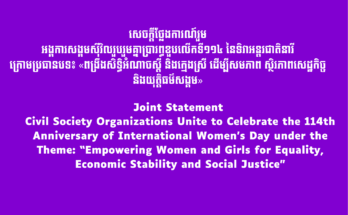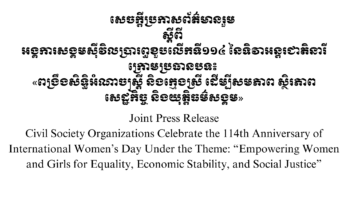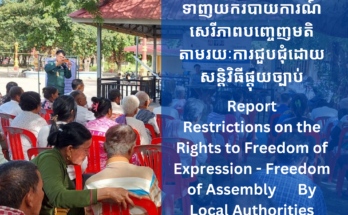While it may seem early to focus on the matter of the ECCC legacy, especially as the Case 002 Trial Hearing is still ongoing, planning is already well underway to ensure the court has the maximum positive legacy. Several meetings have already been convened by NGOs with the aim to map, plan, and coordinate projects and efforts relating to the ECCC legacy. A recent meeting provided the opportunity for collaboration, information exchange and updates related to project and program mapping and coordination regarding the legacy of the ECCC between various stakeholders. After a brief introduction where the objectives of the meeting were clarified, the audience heard a brief update from the many organizations with programs related to the legacy of the ECCC. Given the short time since the previous update meeting (three months earlier) there was minimal progress in many of the projects. Lack or insecurity of funding was a key challenge and cross-cutting issue voiced by many participants.
Each presentation allowed for responses and questions from the audience. Regarding two projects. an annotated code of criminal procedure with the jurisprudence produced during Case 001, and a report focusing on thematic selection of jurisprudence from the ECCC, many concerns were voiced relating to the conflicting legal traditions influencing the ECCC and Cambodian Judicial systems respectively. Concerns focused on the worry that this, relying on jurisprudence from the ECCC, is perhaps a more ‘common law’ approach and therefore less appropriate to guide domestic judicial system in Cambodia’s which is based on the ‘civil law’ tradition. Additionally, ADHOC voiced general concerns over the oversight and coordination of the legacy projects, a concern which was echoed by other attendees.
CHRAC presented the concept and progress for its forthcoming conference on the Legacy of the ECCC on September 13-14th in Phnom Penh. In their presentation CHRAC clarified their understanding of what legacy means, or rather legacies as they explained. They discuss the many different legacies and stressed the importance that the appropriate actor took up the mantle for each. Related to this, they announced their recent decision to invite the ECCC to participate in the conference as facilitator of discussions and presentations related to the more domestic aspects of the legacy. CHRAC and other NGOs will focus on the international aspects of the ECCC legacy.
The meeting served to provide an update on progress, but also an opportunity to stimulate discussion regarding all aspects of legacy and promote refection on how the most positive aspects of the legacy can be supported and enhanced. Furthermore, it provides an excellent occasion for reiteration of the reasons that the legacy of the ECCC is so important.
Why is securing the legacy of the ECCC important?
Securing the legacy of the ECCC is important for many reasons. CHRAC had identified two key prongs of the legacy, the international legacy, and the domestic. The international prong is important because it incorporates how the lessons from the ECCC will be translated and inform future international and hybrid tribunals across the world, including the ICC itself. The victim participation scheme of the ECCC has earned much acclaim and for good reason. This system of involving victims in the court’s proceedings represents an important step towards more victim-orient international justice. However, this does not automatically mean that this experience will inform future tribunals or further the overall progress towards protecting victims’ rights. This legacy mush be managed, encouraged, and protected. Similarly, the trial must be studied and lessons learned extracted if they are to have any bearing on future and current international tribunals.
Similarly, the domestic legacy of the ECCC must be safeguarded. The proceedings have already produced a wealth of jurisprudence which can help to guide domestic judges in their quest to enforce the Cambodian criminal procedures and penal code. The technical skills, capacity and training gained through the experience of the ECCC will also prove invaluable towards furthering the goal of building an improved, independent, and capable judiciary in Cambodia. But these skills must be harness and developed further if they are to translate into durable positive improvements to the legal system.
Finally, arguably the most important legacy of the ECCC is the legacy itself- the legacy of having a legacy. The ECCC represents the first time the legacy of an international criminal tribunal has been so proactively and promptly discussed, while the court is ongoing. In this way, it provides an opportunity for legacy planning and programming to become common practice and lessons to be learned from this first attempt. In previous ICTs, for example in the case of the International Criminal Tribunal for Rwanda, planning and programming related to the tribunals’ legacy has not been undergone during the course of the trials. This revolutionary approach of the ECCC provides an opportunity for the establishment of the practice of legacy planning for ICTs as a crucial tool in the Transitional Justice toolkit.
It is in all these ways, and many others, that the safeguarding of the legacy of the ECCC is important. While the ECCC serves first and foremost as an agent for justice regarding the crimes committed under the Khmer Rouge regime, it also has the capacity to do so much more in the future for the people of Cambodia- through its legacy.
Recommendations
The meetings and ongoing discussions related to the ECCC legacy have highlighted both the importance of the task and the work left to be done. ADHOC is encouraged by the progress and commitment to ensuring a positive legacy for the ECCC but has several concerns relating the implementation of this aim. ADHOC recommends the following actions:
- Continued discussion and work to be done to establish an official authority and coordinator for the ‘legacies’ of the ECCC. The effectiveness and sustainability of the collective legacy work being done would benefit from institutionalization. Whichever body takes control and authority of coordination and oversight of the legacy work, it would benefit from official endorsement by NGOs, civil society organizations, as well as the Royal Government of Cambodia.
- There is also a need for the establishment of a coordinating counterpart in the Government. This will help to ensure that projects are not completed and ignored but rather ensure maximum impact through meaningful governmental involvement.
- Certain projects require government endorsement to be effective in the way they intend. While the establishment or identification of a governmental body to oversee legacy issues is pending, obtaining official endorsement of legacy projects related to the domestic legacy (i.e. the annotated criminal code and report on thematic issues of ECCC jurisprudence) should be prioritized so as to ensure these projects have a real effect in the domestic courts.



